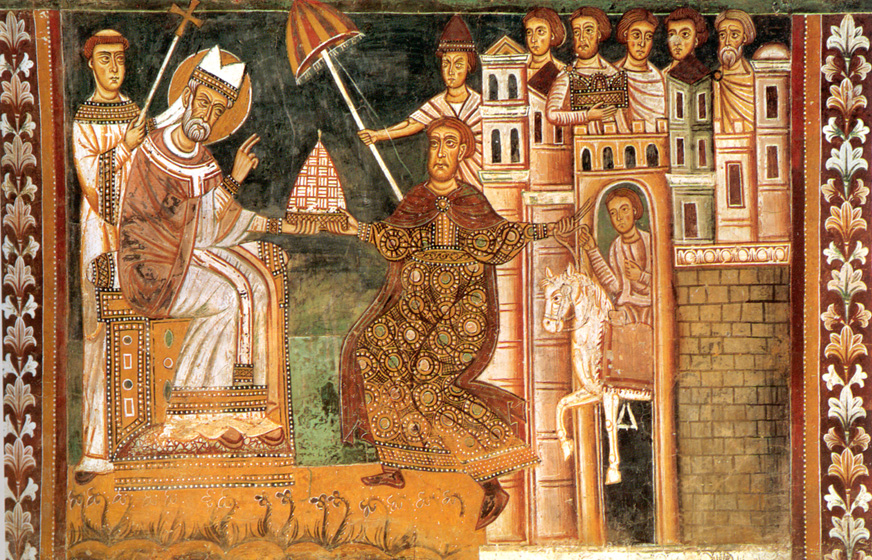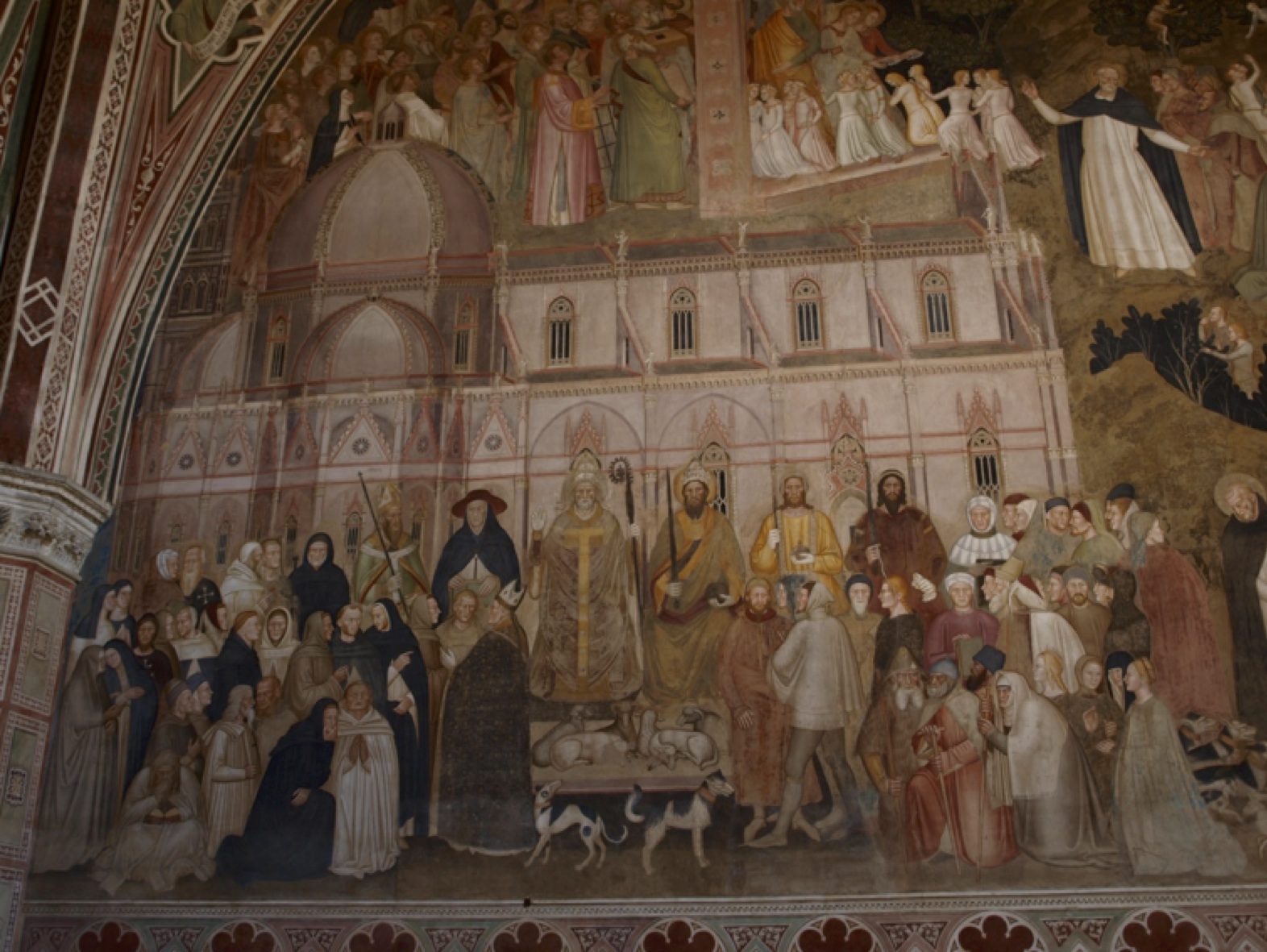4. Den vestlige kristendom
Det vestromerske riges fald i 476 blev efterfulgt af adskillige kongedømmer, der skabte et politisk og kulturelt landskab, som adskilte sig fra det østromerske rige, hvor kejserriget bestod indtil 1453. Kristendommen udviklede sig derfor på forskellig vis i øst og i vest. De økumeniske konciler, der forsamlede biskopper med forskellige baggrunde og overbevisninger, ophørte, hvilket mindskede muligheden for en kontinuerlig dialog mellem dem, ligesom sprogfærdigheder i græsk og latin gradvist aftog på hver side af denne øst-vest-deling; den sproglige grænse gik i nærheden af det nuværende Bosnien. En vestlig (latin) kristendom udviklede sig parallelt med en østlig (græsk) kristendom. Forholdet mellem dem har været både godt og skidt i tidens løb, men deres forskellighed er ikke blevet mindre. Denne side fokuserer på den vestlige kristendom, mens den næste side koncentrerer sig om den østlige. .
Sylvester og Konstantin
Konstantins gavebrev er en af de mest berømte forfalskninger. Dokumentet er skrevet i 700-tallet, i en tid, hvor pavedømmet søgte at retfærdiggøre sine politiske ambitioner. Teksten, dengang betragtet som ægte, blev inkluderet i Decretum Gratiani (”Gratians Dekret”), en samling tekster om og organisering af kirkeloven, som blev udsendt i 1140. Denne tekst gav pavedømmet det juridiske grundlag for at gøre sig gældende over for vesteuropæiske herskere. Humanisten Lorenzo Valla (1407-1457) afslørede dokumentet som en forfalskning.

Anonym fresco fra 1200-tallet;
den fremstiller Sylvester og Konstantin. San Silvestro kapellet,
Santi Quattro Coronati (Rom).
Retrieved from http://commons.wikimedia.org/wiki/File:Sylvester_I_and_Constantine.jpg
Det konstantinske gavebrev
“And we ordain and decree that he shall have the supremacy as well over the four chief seats Antioch, Alexandria, Constantinople and Jerusalem, as also over all the churches of God in the -whole world […]. In imitation of our own power, in order that for that cause the supreme pontificate may not deteriorate, but may rather be adorned with power and glory even more than is the dignity of an earthly rule: behold we-giving over to the oft-mentioned most blessed pontiff, our father Sylvester the universal pope, as well our palace, as has been said, as also the city of Rome and all the provinces, districts and cities of Italy or of the western regions; and relinquishing them, by our inviolable gift, to the power and sway of himself or the pontiffs his successors-do decree, by this our godlike charter and imperial constitution, that it shall be (so) arranged; and do concede that they (the palaces, provinces etc.) shall lawfully remain with the holy Roman church.
Wherefore we have perceived it to be fitting that our empire and the power of our kingdom should be transferred and changed to the regions of the East; and that, in the province of Byzantium, in a most fitting place, a city should be built in our name; and that our empire should there be established. For, where the supremacy of priests and the bead of the Christian religion has been established by a heavenly ruler, it is not just that there an earthly ruler should have jurisdiction.”
The Donation of Constantine, oversat af Ernest F. Henderson.
Den kæmpende og den triumferende kirke
Santa Maria Novella basilikaen blev bygget af dominikanerne i 1246; et tilstødende kloster blev bygget senere. Det spanske kapel er klostrets forhenværende domkapitel, bygget mellem 1343 og 1345. Det blev udsmykket af Andrea di Bonaiuto da Firenze og hans assistenter mellem 1365 og 1367. Den store fresco på væggen til højre fremstiller den ”aktive og triumferende” kirke. Udstillingsgenstanden viser den venstre side af frescoen.

Den kæmpende og den triumferende kirke.
Fresco af Andrea di Bonaiuto da Firenze,
Det spanske kapel, Santa Maria Novella (Firenze),
1365-1367. Foto: Anna van den Kerchove.
Pavelig bulle: Vigilantia universalis
De beslutninger, som det romerske koncil tog i 1059, udgør grundstenen i den gregorianske reform. De blev taget på et tidspunkt, hvor pavedømmet forsøgte at udfordre de verdslige magters greb samt genetablere gejstlighedens moralske retskaffenhed. Dokumentet gengiver ikke direkte romerkoncilets beslutninger, men er et brev, hvori Pave Nikolaus II (regent 1058-1061) henvender sig til hele den kristne menighed, og som kundgør koncilets beslutninger. Hovedtemaerne i den gregorianske reform diskuteres i uddragene.
“By watchfulness over the government of the universal Church we owe to all men constant care; and we also provide for your salvation. We desire therefore to notify you of all that was canonically done in the recent synod at Rome of a hundred and thirteen bishops, under our unworthy presidency; because, for your salvation we expect you to be executors thereof and we command your obedience thereto by our apostolic authority.
1. First of all, in the sight of God, it was ordained that the election of the Roman pontiff shall rest with the Cardinal-bishops lest, if anyone, without their unanimous and canonical election, as aforesaid and then without the consent of the religious clergy and laity following, should be enthroned, we should have a pope who is not apostolic but an apostate […].
3. No one shall hear the Mass of a presbyter whom he knows for certain to have a concubine or a woman-companion. Wherefore the synod itself ordained this statute under pain of excommunication, saying: “Whosoever, whether priest, deacon or sub-deacon, in accordance with the decree of our predecessor St. Leo [IX] of blessed memory on the chastity of clerks, openly takes a concubine or refuses to leave her, we, on behalf of Almighty God and with the authority of blessed Peter and Paul, by this ordinance, entirely forbid to sing Mass, or to read either the Gospel or the Epistle at Mass, or to remain at divine service side by side with those who obey the said decree, or to have a stipend from the church.”
4. And we ordain that those of the aforesaid Orders who, in obedience to our predecessor, keep chastity in the churches to which they have been ordained, as becomes religious clerks, shall eat and sleep and share in common whatever is assigned to them by the church; and we require and command that they shall above all things be zealous to live the apostolic, i.e. the common, life […].
6. No clerk or presbyter shall obtain a church from the laity whether by grant or payment […].
9. No one shall be ordained or promoted to any ecclesiastical function simoniacally.
10. No cleric of any Order shall be judged, or put out of his church by laymen […].
13. No layman shall be suddenly promoted to any ecclesiastical rank, except he first puts away his secular dress, and receives approval after living day by day in the company of clerks.”
Vigilantia universalis, oversat af B. J. Kidd, Documents Illustrative of the History of the Church, vol. 3.






